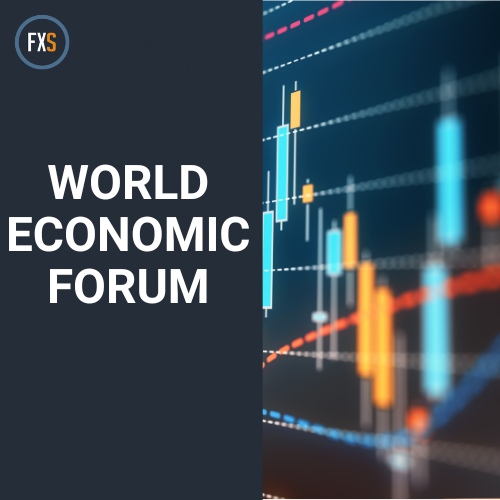ECB Lagarde: Eurozone, global inflation is coming down
- Christine Lagarde spoke on Friday at the World Economic Forum in Davos.
- ECB President didn't speak about monetary policy in her panel discussion.
- European Central Bank held rates for the second straight meeting in December.

Christine Lagarde, President of the European Central Bank (ECB), spoke at the World Economic Forum (WEF) in Davos. It was the last of her three appearances at the WEF Annual Meeting this week.
Having spoken on the "How to Trust Economics" panel on Wednesday and "Uniting Europe's Markets" on Thursday, ECB President Lagarde participated on Friday in a panel discussion on "The Global Economic Outlook".
Friday’s debate offered views on how policymakers would balance the need for action on growth and inflation by implementing the right tools while ensuring sustained and long-term economic growth. Lagarde said that inflation is coming down in the Eurozone and worldwide, and also that there are signs the job market is loosening.
However, she refrained to comment specifically on monetary policy during her commentary on the economic outlook as the ECB has entered its “blackout period” ahead of next week’s policy meeting.
"We are going from normalization to non-normality," Lagarde said. The ECB president highlighted that consumption continues to be a driving force for economic growth, but also that this tailwind is fading. With less tight job markets and falling excess savings, "consumption isn't as strong as it used to be," Lagarde said.
On Wednesday, Lagarde spoke in a Bloomberg interview on the sidelines of the WEF Annual Meeting in Davos, noting that “it is likely that we will cut rates by the summer.”
Christine Lagarde’s remarks prompted markets to dial back early rate cut expectations. ECB policymakers have continued to push back against aggressive rate cut expectations, suggesting that the central bank will remain data-dependent on its interest rate outlook.
The European Central Bank held rates for the second meeting in a row in December, as it revised down its growth and inflation forecasts. “The Governing Council’s future decisions will ensure that its policy rates will be set at sufficiently restrictive levels for as long as necessary,” the ECB said in its accompanying statement.
About Christine Lagarde
Christine Lagarde was born in 1956 in Paris, France. Graduated from Paris West University Nanterre La Défense and became President of the European Central Bank on November 1st 2019. Prior to that, she served as Chairman and Managing Director of the International Monetary Fund between 2011 and 2019. Lagarde previously held various senior ministerial posts in the Government of France: she was Minister of the Economy, Finance and Industry (2007–2011), Minister of Agriculture and Fishing (2007) and Minister of Commerce (2005–2007).
Euro price today
The table below shows the percentage change of Euro (EUR) against listed major currencies today. Euro was the strongest against the Pound Sterling.
| USD | EUR | GBP | CAD | AUD | JPY | NZD | CHF | |
| USD | 0.09% | 0.27% | 0.03% | 0.08% | 0.13% | 0.26% | 0.09% | |
| EUR | -0.09% | 0.18% | -0.05% | -0.02% | 0.04% | 0.17% | 0.00% | |
| GBP | -0.31% | -0.22% | -0.28% | -0.24% | -0.18% | -0.05% | -0.22% | |
| CAD | -0.03% | 0.06% | 0.24% | 0.02% | 0.09% | 0.23% | 0.05% | |
| AUD | -0.06% | 0.05% | 0.28% | -0.03% | 0.07% | 0.22% | 0.07% | |
| JPY | -0.13% | -0.06% | 0.16% | -0.10% | -0.08% | 0.18% | -0.04% | |
| NZD | -0.26% | -0.22% | 0.03% | -0.28% | -0.24% | -0.12% | -0.18% | |
| CHF | -0.08% | 0.04% | 0.18% | -0.05% | -0.02% | 0.07% | 0.16% |
The heat map shows percentage changes of major currencies against each other. The base currency is picked from the left column, while the quote currency is picked from the top row. For example, if you pick the Euro from the left column and move along the horizontal line to the Japanese Yen, the percentage change displayed in the box will represent EUR (base)/JPY (quote).
US Dollar FAQs
What is the US Dollar?
The US Dollar (USD) is the official currency of the United States of America, and the ‘de facto’ currency of a significant number of other countries where it is found in circulation alongside local notes. It is the most heavily traded currency in the world, accounting for over 88% of all global foreign exchange turnover, or an average of $6.6 trillion in transactions per day, according to data from 2022.
Following the second world war, the USD took over from the British Pound as the world’s reserve currency. For most of its history, the US Dollar was backed by Gold, until the Bretton Woods Agreement in 1971 when the Gold Standard went away.
How do the decisions of the Federal Reserve impact the US Dollar?
The most important single factor impacting on the value of the US Dollar is monetary policy, which is shaped by the Federal Reserve (Fed). The Fed has two mandates: to achieve price stability (control inflation) and foster full employment. Its primary tool to achieve these two goals is by adjusting interest rates.
When prices are rising too quickly and inflation is above the Fed’s 2% target, the Fed will raise rates, which helps the USD value. When inflation falls below 2% or the Unemployment Rate is too high, the Fed may lower interest rates, which weighs on the Greenback.
What is Quantitative Easing and how does it influence the US Dollar?
In extreme situations, the Federal Reserve can also print more Dollars and enact quantitative easing (QE). QE is the process by which the Fed substantially increases the flow of credit in a stuck financial system.
It is a non-standard policy measure used when credit has dried up because banks will not lend to each other (out of the fear of counterparty default). It is a last resort when simply lowering interest rates is unlikely to achieve the necessary result. It was the Fed’s weapon of choice to combat the credit crunch that occurred during the Great Financial Crisis in 2008. It involves the Fed printing more Dollars and using them to buy US government bonds predominantly from financial institutions. QE usually leads to a weaker US Dollar.
What is Quantitative Tightening and how does it influence the US Dollar?
Quantitative tightening (QT) is the reverse process whereby the Federal Reserve stops buying bonds from financial institutions and does not reinvest the principal from the bonds it holds maturing in new purchases. It is usually positive for the US Dollar.
Author

FXStreet Team
FXStreet

















